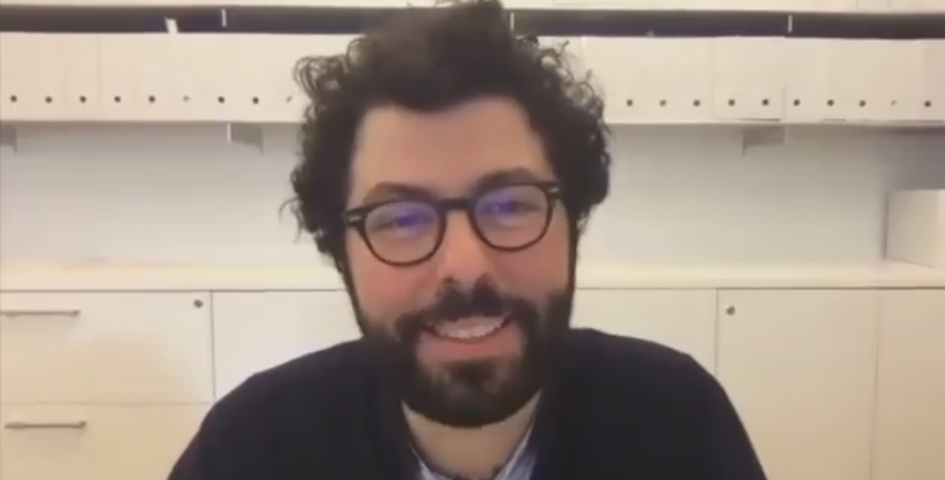The Flying Whale is a non-profit organization with big ambitions: to build a cultural bridge between Italy and America, focusing on young people. The project’s board includes Caterina Monda, Jacqueline Greaves, Judith Thurman, Ginevra Caltagirone, Marlon James, Nina Libeskind, and Daniel Libeskind. The organization is online through social media and its website and goes beyond the web: from the recently established prize to interviews, to a partnership with The Decameron Project for a literary competition.
Although it’s a young project, its roots are strong, and its DNA represents a call for multiculturalism and a sense of responsibility towards stories worth telling. A real platform in the making, it seeks to give voice to anyone who makes art and literature a conduit to improve the human spirit. In this interview we chat about the competition and The Flying Whale’s mission with the two founders Caterina Monda and Jacqueline Greaves.

Quoting from one of your Instagram posts: “In this recent reality, our desire for connection is stronger than ever. When we come together, we can rise above any obstacle. We can inspire hope, compassion, and empathy. We can do, in short, anything”. Connection, hope, compassion, empathy. What does The Flying Whale represent at a historical moment when art must be preserved and also spread through alternative forms or new ideas? And what are the main focuses of the organization?

Caterina Monda explains, “It all started with a reflection with my mother about the multiculturalism present in our family. I spent many years in New York, and now I live in Milan. My mother, Jacqueline Greaves, is Jamaican, and my father is Italian. We started from how multicultural Italy is and how it is connected to America in many ways, and we decided to tell stories. Cultures, backgrounds and diversity are the key. At a time when we were all locked down reading again and writing again, I found myself doing much research and I developed a strong need to tell stories.”

Jacqueline Greaves: “I was doing some research on vintage black history, and I ran into a story involving Italy and America. A group of African-American singers was sent to Italy in ’54, there had been a moment of tension with the Soviet Union and America was accused of being racist. Big names launched their careers starting from this episode, but no one knows these stories, and no one writes about them. So it’s important to make connections that aren’t necessarily contemporary. Culture is very important in our family, we are especially active in the literary field, both in Italy and in the US, and we want to encourage young people. I have three children who have studied, but the classics are often forgotten. You have to know the Western classics. I say this referring to my Jamaican heritage: you can’t really appreciate the culture of the place where you live if you don’t embrace it and immerse yourself in it.”
Your main focus is literature. The Flying Whale presents itself on social media as a container of beauty, from books to cinema. Are you planning to go deeper with different art aspects?
Caterina Monda: “We are still in a brainstorming phase. We want to encourage young people. That’s why we are on social media. We would like to plan more initiatives inviting them to read and learn. Italy has creativity in its DNA. We want to use it for educational purposes. Therefore, we will conduct a series of interviews to establish different types of conversations with different backgrounds: the website will be updated with other content, such as the interview with Vittorio Calabrese, the young director of Magazzino Italian Art in Cold Spring (NY), and the one with Tamara Pizzoli, acclaimed children’s book author. People who promote culture between Italy and America.”

Let’s talk about The Flying Whale’s first prize to the short-listed Booker Prize nominee Maaza Mengiste for her book The Shadow King. You’ll present the award to her during the literary Festival Le Conversazioni in Capri this summer. Why did you choose this book, and what is the connection with the organization?
Jacqueline Greaves: “We chose The Shadow King because it is a book about Italy. The author Maaza Mengiste is Ethiopian and decided to write a novel about Ethiopian women soldiers during the war between Ethiopia and Italy (1935-1941). Maaza spent two years in Italy doing research. It’s a beautiful book not only about women soldiers but also about the use of photography as a method of torture: Italian soldiers photographed the prisoners, which was a very intrusive way of dealing with one’s intimacy and culture back then. Maaza Mengiste consulted several archives while writing the book. She even created a new photographic one and asked for contributions from families involved in the conflict. The Shadow King will be published in April in Italy by Einaudi.”

(Set during Mussolini’s invasion of Ethiopia in 1935, The Shadow King takes us back to the first actual conflict of WWII and shines a light on the women soldiers who have been left out of the historical record)
Caterina Monda: “We found our own space during Le Conversazioni, an international cultural Festival. The book is super praised, but it still needs discussion, visibility. We are behind the scenes, and we want to uplift those voices, to find a connection. But most importantly, the goal is to keep this initiative going every year with some contributions. For example, the young artist Edoardo Manzoni will design The Flying Whale’s first prize. Every year we will ask an Italian artist under 35 to design a prize inspired by the organization’s mission. On the business side, we want to create a platform that allows exchanges, opens minds and, if possible, creates a change of perspective on the dissemination of art.”

The more we can bring stories to people, the more we discover something about ourselves, and not necessarily something contemporary. Indeed, The Flying Whale comes into contact with the great poet Dante through his partnership with The Decameron Project. March 23 was Dante Day for his 700th anniversary, which was celebrated in New York thanks to The Italian Heritage and Culture Committee of New York, Inc. Tell us about the contest and the connection between Dante, Italy, and America.
Caterina Monda: “The Decameron Project is a student run organization created during Covid to encourage students across the US to share their stories and come together. It all started on Instagram, a bunch of kids in high school trying to get their classmates to express what they were feeling and to write about it. That’s why we loved them. The Flying Whale has officially partnered with The Decameron Project for a literary competition inspired by the poet Dante, starting April 1. The task is to write a short story, essay, or poem based on a prompt, which is a short passage from The Inferno, or an additional one-word prompt, Discovery.” (click here to subscribe)

Who is going to judge the submissions?
Caterina Monda: “Stories will be judged by a panel that includes Brian Selznick, who wrote The Invention of Hugo Cabret, Daniel Mendelsohn, the Editor-at-Large of The New York Review of Books, and Maaza Mengiste, whose novel The Shadow King was short-listed for the Booker Prize. First prize will receive $500, 2nd a $150 certificate from Shakespeare & Co., and 3rd a $50 certificate. Author Nicole Krass will read the 1st prize winner work during a live lecture.”

Why the word “Discovery”?
Jacqueline Greaves: “These students are going to be out in the world soon. But what is this world we live in now? We live in chaos that repeats itself over time. Even during Dante’s time, chaos and scandal were normal. Things change, but humanity is still the same. We want this contest to encourage young people to pick up the “Divine Comedy” and read it. In America, Dante is considered on the level of Shakespeare, as an author mostly studied in college. We could be doing so much more with it.”
Caterina Monda: “We’ve lost a year, but high school and college students are still trying to figure out what they want to do. The Decameron Project focuses on contemporary writers; they were the ones who took a big jump and said, ‘Let’s celebrate a master.’ Our job is to give the younger generation the right tools. They’re the ones who are going to change the future. We strongly believe in cultural exchange in its full meaning.”

One foot in Italy and one in America. The Flying Whale pushes ahead a multicultural project online and offline with the aim to grow and expand itself through initiatives and events. The team behind the organization makes this possible with a great love for culture and an endless passion for all that is knowledge, art, and literature.
Join the competition: https://decameronproject.org/dante/
Website: https://flyingwhale.org
Instagram: @flyingwhaleedition
Facebook: @flyingwhaleedition












